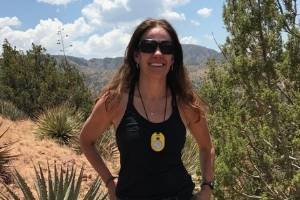 Dr. Helen Poulos, adjunct assistant professor of environmental studies, has been awarded a $300,000 NASA grant to examine forest type-conversion through the lens of evapotranspiration (plant sweat) in response to high-severity wildfire in southeastern Arizona. Poulos and her team will conduct their research using imagery gathered by the ECOSTRESS sensor mounted on the International Space Station. It will be the first-ever test of the ECOSTRESS sensor’s applicability for wildfire-related research.
Dr. Helen Poulos, adjunct assistant professor of environmental studies, has been awarded a $300,000 NASA grant to examine forest type-conversion through the lens of evapotranspiration (plant sweat) in response to high-severity wildfire in southeastern Arizona. Poulos and her team will conduct their research using imagery gathered by the ECOSTRESS sensor mounted on the International Space Station. It will be the first-ever test of the ECOSTRESS sensor’s applicability for wildfire-related research.
Plants facing the aftermath of wildfire often have insufficient water, which causes their temperature to rise. The ECOSTRESS radiometer measures the temperatures of plants across Earth to an extraordinarily accurate degree. Poulos’s NASA-funded project will specifically investigate the effects of the 2011 Horseshoe Two Fire on post-fire plant and site water balance and evaluate the potential of using data gathered from the ECOSTRESS sensor to predict wildfire effects on plant community structure and water relations in an Arizona Sky Island pine-oak forest.
“Hot, big fires are increasing in prevalence across the West, and those fires are changing forest structure and species composition—the conversion of pine-oak forest to oak shrublands, for example,” said Poulos. “In this project, we’ll be deploying a series of sap flow sensors at sites that were burned in the 2011 Horseshoe Two Fire to validate the ECOSTRESS imagery.”
Poulos did her master’s thesis at the Horseshoe Two Fire site, and she’s been working with Wesleyan students since 2016 to resample a large network of forest monitoring plots there to look at the type-conversion question. For the NASA-funded project, Poulos will be bringing Wesleyan students into the field to evaluate long-term wildfire effects and the permanence of type-conversion at the site by completing the 10-year post-fire plot survey.
Researchers from the University of Maine at Farmington (Dr. Andrew Barton) and Northern Arizona University (Dr. Thomas Kolb, Dr. George Koch, and Dr. Andrea Thode) will also be working with Poulos on the project.